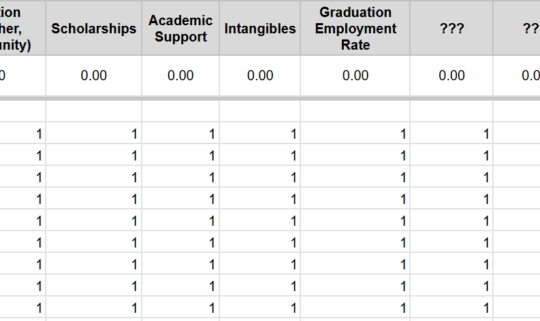Paying for college/trade school is a major concern for students and parents. The period from late August until the summer after graduation is often referred to as scholarship season. October starts with FAFSA, Federal Student Aid. Announcement from Department of Education in early August has a limited number of students can apply in October and the complete application will be available early December. An additional blog post on FAFSA coming soon! Scholarships are an excellent way to finance your college education.
Here are some tips I have gathered from students I’ve worked with in the past:
- There’s no limit to the number of scholarships you can apply for, and the money can add up. Treat applying for scholarships like a paid job.
- Dedicate time each month to apply for scholarships. I suggest applying to five scholarships monthly. Choose a Saturday morning, once a month, to sit down and focus on applications. Don’t be discouraged by the effort involved. Press on!
- Stay on top of deadlines by creating a tracking spreadsheet listing the scholarship name, award amount (if awarded), deadline, and award date.
- Know yourself: Understand your strengths, whether they’re academic, talents, interests, or background, and use them to make a convincing case for yourself when applying for scholarships.
- Start local: Explore scholarship opportunities from schools, community groups, and employers in your area. Local scholarships often have less competition and are tailored to specific community members, such as students from your high school with a specific major.
- Use search tools: Consider using scholarship search engines like Going Merry and Big Future. Create a separate email account specifically for scholarship applications to control email spam.
- If you are employed – ask your employer if they have scholarship opportunities: Employer-provided education encompasses programs designed to assist employees with the financial burdens of education, such as tuition reimbursement and scholarships. These programs may also offer dependent scholarships through a parent’s employer. It’s always beneficial to conduct some research.
- Think outside the box: Don’t overlook small, niche scholarships; there’s usually less competition, and you might be able to combine rewards. Also, look into scholarship programs and endowments offered by the college you plan to attend.
Remember these important tips when applying for scholarships:
- Read the instructions carefully, as missing requirements can lead to disqualification.
- Tailor your materials to highlight why you are a perfect fit for each specific scholarship.
- Your essays are crucial – tell your unique story, be authentic, and proofread meticulously.
- Obtain strong recommendations from teachers or mentors who can speak to your character.
- Always meet deadlines as late applications are rarely considered.
Putting in effort to find and apply for scholarships can make college more affordable and reduce the need for loans.








[…] Financing college education is straightforward but costly. Scholarships offer “free money” and are available at national, local, and college-specific levels. The Free Application for Federal Student Aid (FAFSA) provides financial aid based on a family’s financial status, including grants, federal work-study, and loans for students and their families. Additionally, 529 plans offer tax-advantaged savings for educational expenses. Beyond FAFSA, there are also private student and family loans. […]